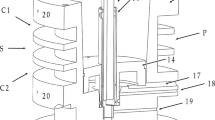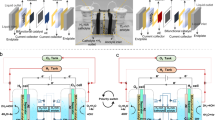Abstract
A RATHER low yield of the heavy water obtained with the usual method of electrolysis, using the single-phase full-wave Tunger valve rectifier, led us to investigate the cause of loss of the heavy water. Besides a good deal of loss through evaporation and spraying, and possibly a loss arising from an exchange reaction occurring at the electrode, the rectified current employed may have been also a contributing factor to the loss.
This is a preview of subscription content, access via your institution
Access options
Subscribe to this journal
Receive 51 print issues and online access
$199.00 per year
only $3.90 per issue
Buy this article
- Purchase on Springer Link
- Instant access to full article PDF
Prices may be subject to local taxes which are calculated during checkout
Similar content being viewed by others
References
Gurney, W. R., Proc. Roy. Soc., A, 134, 137 (1932).
Bell, R. P., J. Chem. Phys., 2, 104 (1934).
Author information
Authors and Affiliations
Rights and permissions
About this article
Cite this article
ASADA, T., HONDE, E. An Effect of Rectified Current from a Tunger Valve upon the Electrolytic Separation of Heavy Water. Nature 139, 885–886 (1937). https://doi.org/10.1038/139885b0
Issue Date:
DOI: https://doi.org/10.1038/139885b0
Comments
By submitting a comment you agree to abide by our Terms and Community Guidelines. If you find something abusive or that does not comply with our terms or guidelines please flag it as inappropriate.



